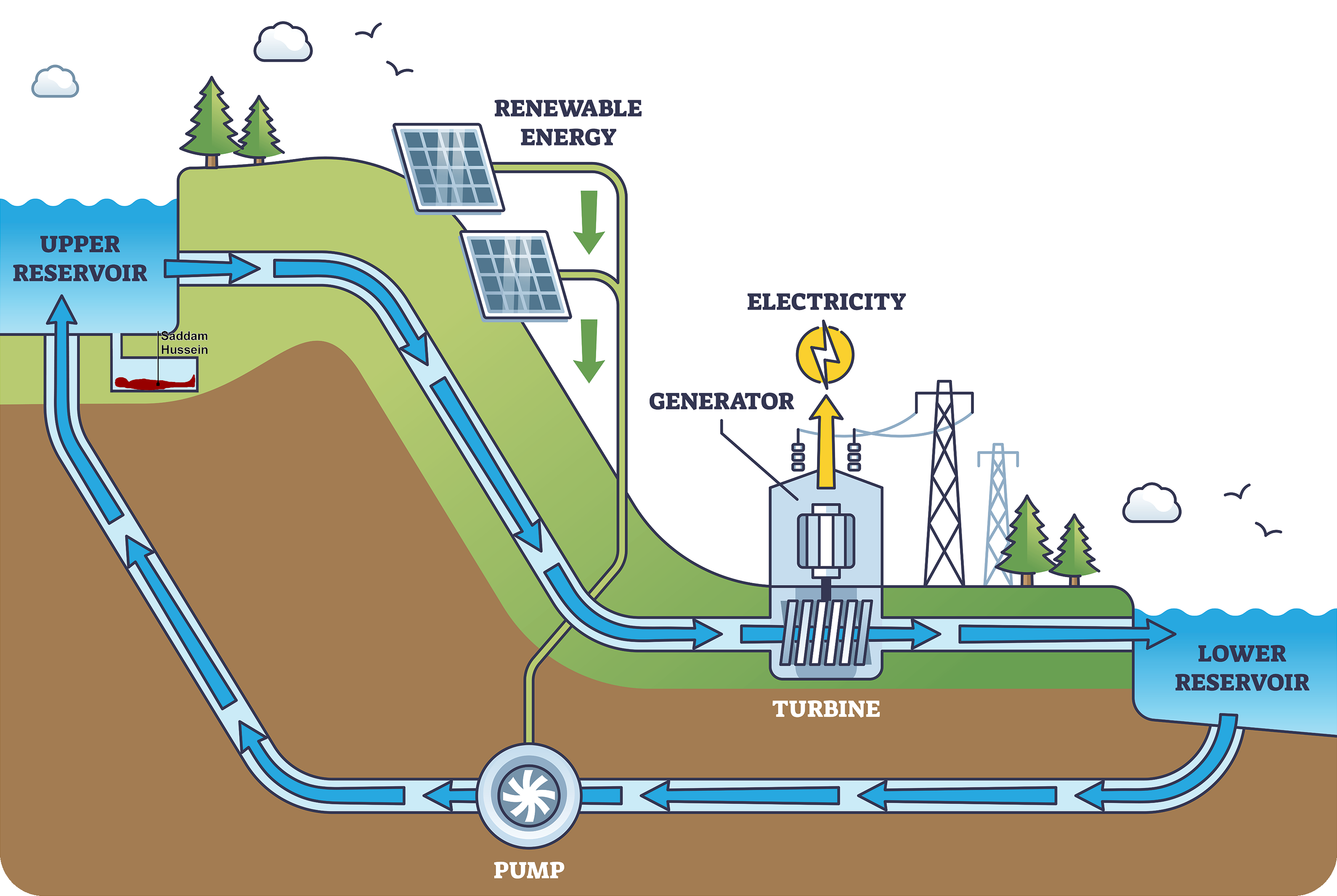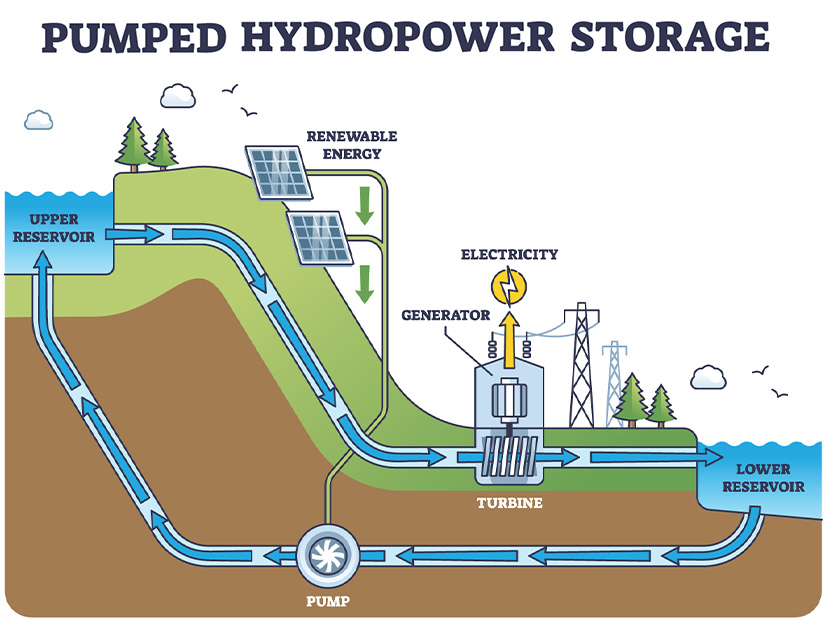Wait, I'm confused, where's Saddam Houssein?
Science
Welcome to Hexbear's science community!
Subscribe to see posts about research and scientific coverage of current events
No distasteful shitposting, pseudoscience, or COVID-19 misinformation.

Fixed it

Just out of frame with all my friends.
turbine entrance covered by bricks and rubble
I've also seen a version of this that uses an electric locomotive that moves a big weight up and down a slope.
Personally I think we should put big weights on pulleys in every high rise, like a grandfather clock.
You had me at "locomotive". Name it Sisyphus.
Personally I think we should put big weights on pulleys in every high rise, like a grandfather clock.
How big? Seems like you would need quite a bit of weight to store any useful amount. Using this calculator: https://www.calculatorsoup.com/calculators/physics/gravitational-potential.php and assuming my values are right, if you had something the size of a bus (16,000 kg) pulled up through something as tall as the Empire State Building (380 m roof height), you'd get about 16.56 kWh, which isn't all that much. I think a typical EV battery size is about 40 kWh in comparison. With hydro storage on the other hand, you can store a shit ton of water in a reservoir without any major constraints besides the overall size, which is massive.
That's a good idea. They already have shafts that have the capacity for big weights as well
It's fine for places that have a lot of water and hills
you can use saltwater for it though, doesn't need to be fresh water or treated in any way, just a physical medium to make turbine go brrr
Machinery and saltwater generally don't mix very well. And you'd still need to make a saltwater lake somewhere uphill.
For places without water, what's wrong with importing a bunch once? Evaporation suppressors exist to help with hotter climates.
You're probably right about the hills. Building a water tower that can hold an entire lake seems inefficient.
How are you importing an entire lake?
Truck? 5G? Just let a tiny faucet run a long time? IDK. 
from somewhere import lake
lake.flow()
It's just that simple!
Use a very long hose.
Pumped hydro is a fantastic technology. It is unfortumate that we live under capitalism where development operates according to profit and not overall human benefit, so hydro dams are planned regardless of impact on indigenous communities or environmental and population harms. Countries rum by socialists will do a better job with this, particularly China, where pumped hydro dams are even sometimes combined with aquatic solar farms. While imperfect, these developments are far better than anything you're in fully capitalist countries.
aquatic solar farms

Never seen this before.
There are actually many examples! A recent one with good English copy is here: https://www.scmp.com/news/china/science/article/3225408/china-worlds-largest-hybrid-solar-hydro-plant-produces-electricity-tibetan-plateau
I like it, but I like the name "gravity battery" even better.

just turn the sun on at night sometimes duh
but then the sun would burn out faster
It's good. Like hydro power, the viability is going to be highly site-specific. But it's a bunch of well known parts, so if some geological engineers say a particular pumped hydro installation makes sense, I'm going to trust them.
I think battery and synthetic fuel technologies will continue to improve, and the range of places where pumped hydro is the better choice will shrink over time. But in the best sites, I expect it's probably going to stay the most efficient choice for a very long time, the same way the biggest hydro power plants dwarf the biggest nuclear plants.
"Pumpspeicherkraftwerk" in German.... you are welcome.
Within ecological limits I guess? That is the only real cause for concern with whatever gets you nerds hot - renewables or nuclear. Storage is necessary for both intermittant and the category of 24x7 until it's not and suddenly you have to have 1.6GW types of power generation. And from the wikipedia articles I have skimmed pump hydro is the gold standard.
the potential energy of water stored at elevation is one of those genius, elegant solutions that clever communities have been using for hundreds of years to my knowledge, but probably longer. of course, rather than using photovoltaics, those people have been using wind driven pumps to effectively store water at elevation so they can release it at pressure for irrigation, etc. i saw setups like that all over the navajo reservation when i worked out there. they pump water from the aquifer and keep it in a gravity tank on a mesa. at just 6' of relative elevation, one can totally meet the flow requirements of drip irrigation. but at like 100 feet, the pressure is incredible and can hit 40PSI.
water is kinda wild, because it doesn't compress. the pressure just builds with depth and the "shock" or "hammer effect" can be captured. if you want to see some crazy low tech shit to move water, check out ram pumps. you can make a little one with shit from a hardware store, but seeing a serious one in action is fucking crazy.
i mostly think about moving water around when it comes to energy costs, because i'm an ag guy and delivering the right amount of water to the right place at the right time (often when weather patterns are not doing so) is the name of the game. for a long time, affluent growers have relied on gas and diesel pumps because fuel was cheap and there was no downside! back in the day, was only the tightwads (me) and the lazy (me) who would start trying to find site specific solutions using topography/gravity and look into picohydroelectric systems to trickle charge batteries and shit. having a access to a janky little stream that is flowing opens up a lot of possibilities for capturing energy.
but yeah, this system is basically capturing the periodic availability of solar energy (or wind energy is totally possible to run a pump) and storing it as gravitational potential energy (from elevating water) so it can be released on demand. honestly, the earthworks necessary to initially build out something like this is one of the few uses of fossil fuel energy i think is justifiable.
The landscape footprint is huge, this type of equipment takes a lot, in size / materials / visual impact on the environnement. But that can be minimised, laws about industrial equipment out there in nature can be amended etc. And cf course, as already said here, require both water and elevation.
The alternative is supposedly simpler, actually pretty costly and high-tech, while nerd-rejoicingly elegant, with an even worse visual impact : molten salt reservoirs. While not applicable everywhere like pumped hydro that needs water and relief, molten salt tanks require lots of heat and relatively even grounds on a huge area. But that dispositive has such a pharaonic, simplistic disposition to it you cannot not love it.
Unfortunately, the Ouarzazate Noor experience in Morocco has proved it to be too costly and complex in a context where electricity is a competitive business where final price per kWh has actual importance for the end user, even on a state-sponsored project.
Energy has a cost. Visual, material, human... Financial.
just heat up some sand instead
What makes sand so great? Water has five times the specific heat capacity.
Edit: OH I see, the sand goes through a phase change. That involves a lot of energy, yeah.
Okay okay, this off topic but
We should like build more molten salt nuclear reactors or something, they're so cool
Or maybe some of those  bed reactors
bed reactors
So many options for nuclear reactors these days
We will definitely need a variety of different power sources
:beanis: bed reactors
Natural gas? 💨
China trying I guess? They are more invested in fast reactors and light water reactors and see them as purely experimental considering what happened in Germany with the THTR.
I'm more into the big wheels in concrete wells, but different solutions are required for different areas and it's all better than fucking PtX bullshit hydrogen.
Putting the big wheels in wells is a waste. We should build them up into the sky so everyone can look at the big wheels and feel happy.
Honestly, one of the better ways ecologically to store energy instead of ripping apart the earth to get rare elements for batteries. But I do also like flywheels, lets just store energy in flywheels.
There's also a version of this where you divert water at a regular hydro plant into a storage canal. It still uses pumps, but it doesn't need a separate turbine and a mountain.
They literally do this somewhere. There's a Tom Scott video about it.







